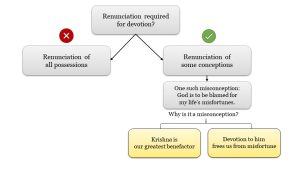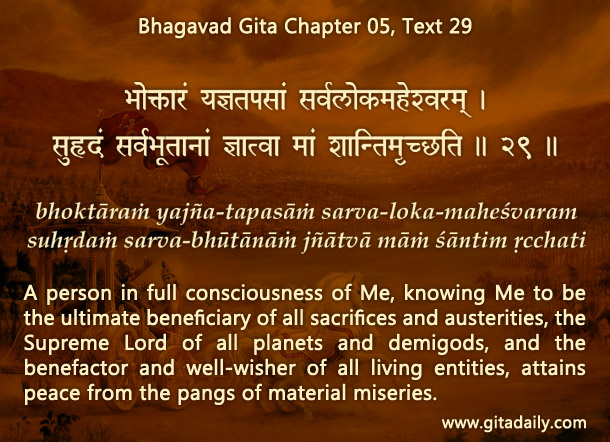 Unlike some other spiritual paths, bhakti-yoga doesn’t require us to renounce all our possessions. Still, it does require us to renounce some of our conceptions – especially the notion that God is to be blamed for our life’s misfortunes.
Unlike some other spiritual paths, bhakti-yoga doesn’t require us to renounce all our possessions. Still, it does require us to renounce some of our conceptions – especially the notion that God is to be blamed for our life’s misfortunes.
Why might we have such a notion? Because we may infer erroneously from a spiritual truth: God is the ultimate cause of everything; therefore, he is the cause of our life’s problems too. However, God is the cause of our life’s events in the same way that rain is the cause of vegetation. Just as rain doesn’t cause specific vegetation to grow at a specific place, God doesn’t cause specific misfortunes to happen to specific people – such events are largely determined by the free will of the individuals involved.
Why does this notion about God’s culpability need to be renounced? Because it is a lie that is toxic for our devotion. We can’t wholeheartedly love someone if we think that they are intentionally causing problems for us.
How can we renounce this notion? By shifting our focus. The exact cause of misfortunes can sometimes be extremely difficult to determine (Bhagavad-gita 04.17). Whenever we can’t ascertain that cause despite using our God-given intelligence, it’s best that we change our driving question – from “Why is this happening to me?” to “Now that this has happened, what can I do to make things better?” This latter question arises from the understanding that God wants the best for us, even amid misfortunes — after all, he is our greatest benefactor (05.29). When we try to make things better in a mood of service to him, we access an inner strength that raises us above all obstacles (18.58).
One-sentence summary:
Devotion requires renunciation: renunciation of the lie that God is in any way to blame for life’s misfortunes.
Think it over:
- What is the renunciation that is necessary for devotion?
- What’s wrong with the notion that God is the cause of our life’s misfortunes?
- How can we renounce this notion?
***
05.29: A person in full consciousness of Me, knowing Me to be the ultimate beneficiary of all sacrifices and austerities, the Supreme Lord of all planets and demigods, and the benefactor and well-wisher of all living entities, attains peace from the pangs of material miseries.
To know more about this verse, please click on the image


GOD is unseen,so everybody blame HIM
Hare Krishna. So many wonderful points are being made that can bring Krishna consciousness from a theoretical level to a way of life that can be practiced every day. Thank you.
Just one little thing. If you could please use a capital letter when referring to Krishna ie He, His, Him.
That is the accepted standard when referring to God.
Thanks for your kind words. Regarding the standard, it was an accepted identity for a few centuries in English (there’s no capitalization in Sanskrit) and is no longer the standard. I have explained it elaborately here:
https://www.thespiritualscientist.com/2020/06/by-using-the-lower-case-pronoun-for-krishna-arent-you-minimizing-his-position/
and
https://www.thespiritualscientist.com/2012/09/why-do-you-use-the-lower-case-pronoun-for-god-he-instead-of-he-isnt-it-disrespectful/